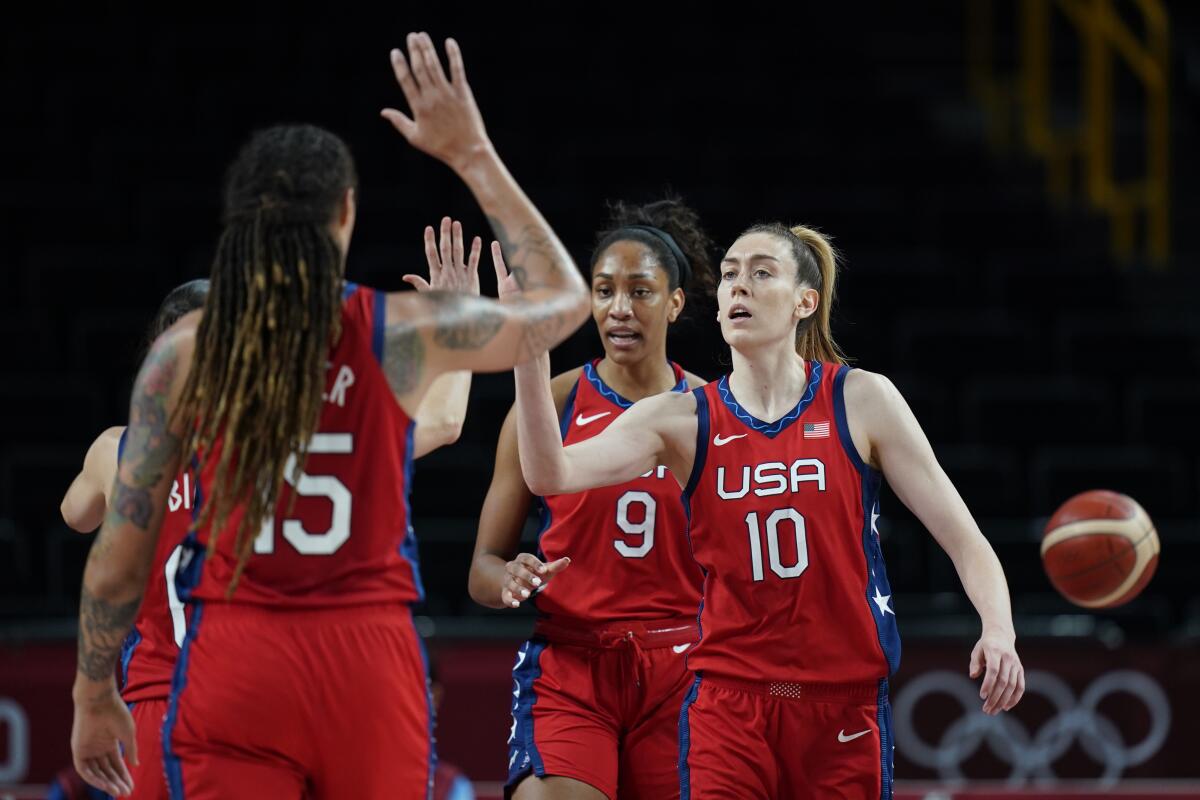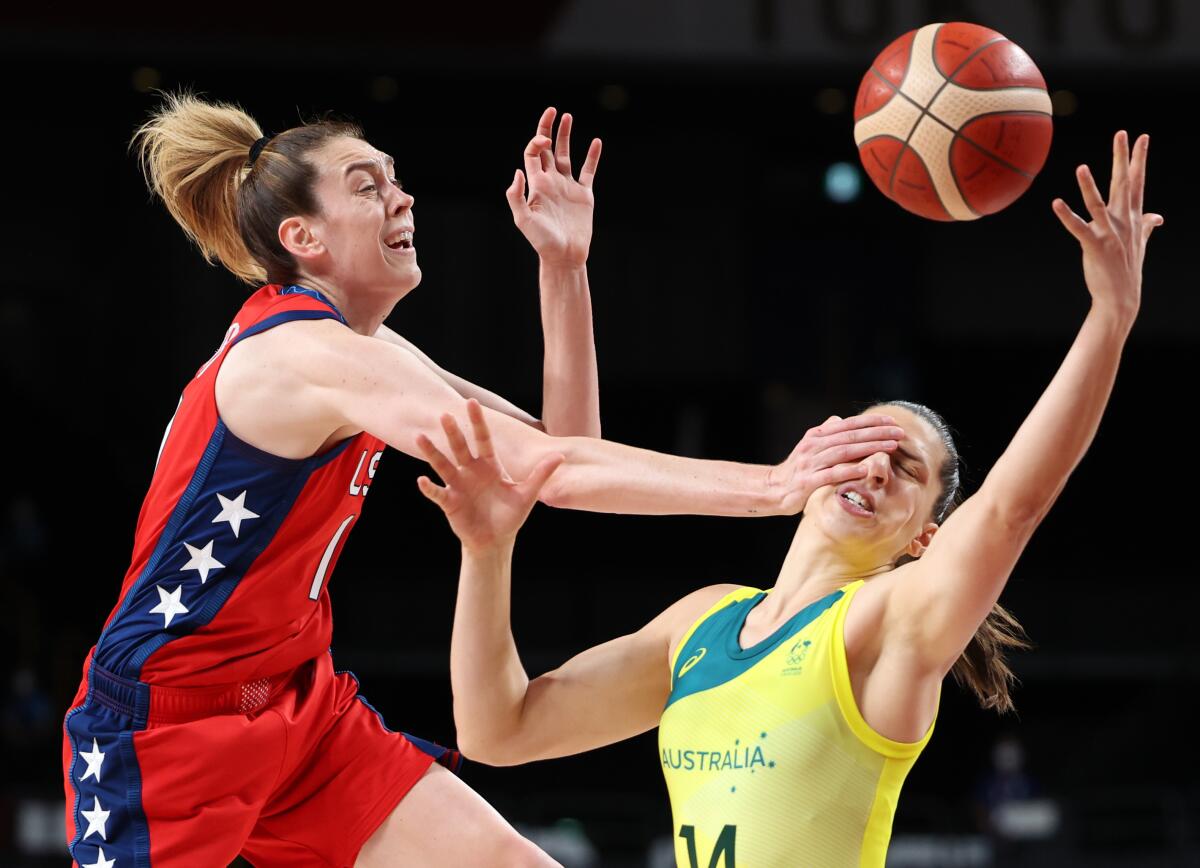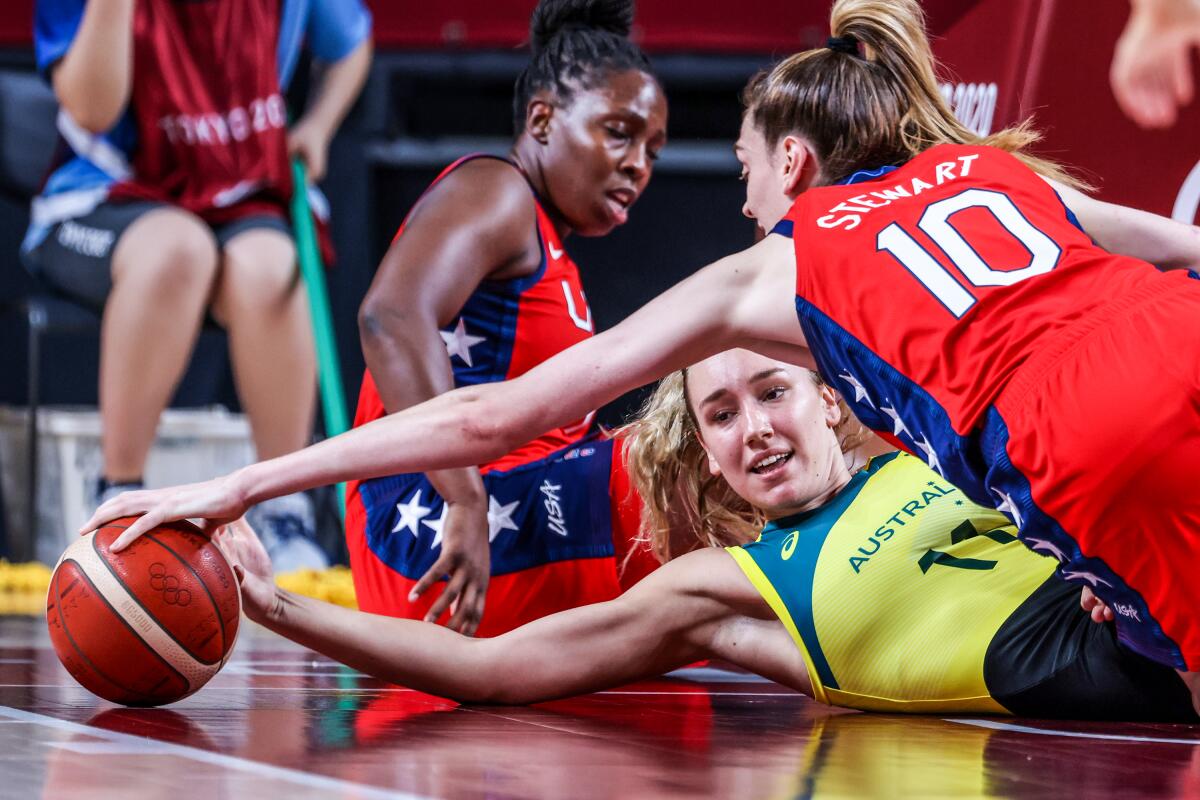Column: Breanna Stewart is primed for Olympic gold, in Tokyo and future Games

- Share via
SAITAMA, Japan — Breanna Stewart has it all figured out.
She was a first-time Olympian in Rio at 21. The one-year delay in staging the Tokyo Games puts her at 26 now, and she’d be 29 at Paris in 2024. Doing the math, she calculated she can not only match teammates Diana Taurasi and Sue Bird by playing in five women’s Olympic basketball tournaments, but can outdo them in one respect: She would be younger in her fifth Games than Taurasi, 39, and Bird, 40, are here.
“It’s something we talked about actually in practice, probably last week,” Stewart said. “If I am a five-time Olympian, I’ll be 37. So I’m younger than the two of them. So, it’s possible.”
Not so fast, Taurasi said jokingly. “She’s OK, she’s got a long way to go,” Taurasi said. “Let’s work on two first.”

Stewart is helping ensure her second Olympic experience will be as successful as her first, which ended with a gold medal.
The former UConn star and two-time WNBA champion with the Seattle Storm is playing a bigger role for the U.S. here than she did in Rio, where she averaged 10.9 minutes a game and 8.1 points a game. Stewart scored 20 of her game-high 23 points in the first half of the Americans’ 79-55 quarterfinal rout of Australia on Wednesday at Saitama Super Arena, boosting her tournament averages to 32.6 minutes and 16 points per game.
The U.S. women’s basketball team didn’t enter the Olympics on the strongest of runs, but their victory over Australia proves they are as dominant as usual.
“The way she did it, inside, outside, she was unconscious. She took great shots. She was efficient,” U.S. coach Dawn Staley said. “But really what stands out to me — we know that Stewie can score — is her defensive effort. We asked her to chase those guards around, something that she doesn’t do a whole lot. And she’s committed to it, and she got deflections. She got blocked shots. She’s just in plays. So super proud of the all-around effort that she gave us.”
Playing more of a small forward role than her usual power forward position, Stewart provided the push the U.S. needed to play and feel more like its cohesive self again. The tournament format gave them only three preliminary-round games to find their identity, and they weren’t sure who they were until they thrived in their first knockout round challenge. “I think today we’re starting to find our DNA a little bit, which is a good thing,” Taurasi said.
Stewart accelerated that search on Wednesday, going on a tear by repeatedly driving to the basket and stirring the offense after Australia had managed to go ahead 6-4. She didn’t settle for anything at either end of the floor, instead playing aggressively and setting a determined and energetic tone.

That was the last lead for the Opals, who haven’t been able to regroup since dominant center Liz Cambage withdrew from the Olympics because of mental health issues. Australia finished the tournament 1-3.
“It was a very focused and aggressive USA team today,” said Australia coach Sandy Brondello, who also coaches the WNBA’s Phoenix Mercury and has the luxury of having Taurasi on that roster.
“We [with the Mercury] like to say, ‘We have Diana Tarausi and you don’t.’ Well, the USA can say, ‘We have Breanna Stewart and you don’t.’ She’s just an amazing player. We wanted to crowd her but she just has a lot of shotmaking abilities.”
Staley said Stewart was primed to play like this here and in future Olympic tournaments based on Stewart’s growth and her willingness to observe and learn from her elders in Rio, where Taurasi and Bird each won a fourth straight gold medal. Staley said Stewart took notes at the 2016 Games, though Staley meant that figuratively. Stewart said she didn’t actually write or record anything, and she didn’t need to. She simply absorbed every bit of her experience, digested it, and put it to good use at every level since then.
“I was fresh out of college, just drafted and continuing to be a sponge,” Stewart said. “I mean, if I looked at all the people around me, from the coaches with Dawn and the players, there were so many Olympians on that team, previous Olympians, and just knowing that I was just at the start of my career with the national team and wanting to continue that, continuing to make sure I do my best to represent the USA and help the team get the gold medal.”
The U.S. women’s basketball team has won six straight Olympic gold medals, and the current version will take a 53-game Olympic winning streak into its semifinal matchup against Serbia on Friday. Taurasi and Bird are the seventh and eighth players, male or female, to compete in five Olympic basketball tournaments.
Taurasi and Bird won’t go on forever. But they can feel secure about passing the U.S. basketball torch to Stewart, who is ready to carry it proudly — and to someday match her mentors’ five Olympic appearances.
“I think that we have improved every game from pool play, from the first game to the last. But knowing that this is the knockout stage — win or go home — we wanted to be our best and continue to trend upward,” Stewart said. “So I think that we handled business today but know that there’s more business to be done on Friday.”
More to Read
Go beyond the scoreboard
Get the latest on L.A.'s teams in the daily Sports Report newsletter.
You may occasionally receive promotional content from the Los Angeles Times.









